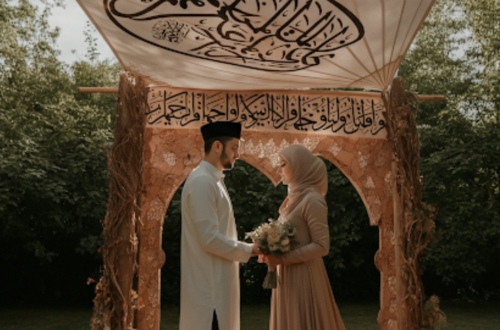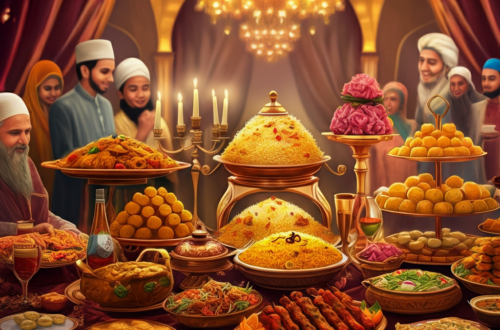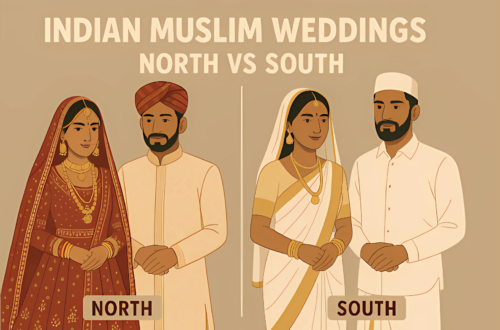Islam presents a comprehensive way of life, far more than mere rituals. Marriage holds a particularly sacred and pivotal position within this framework. Muslims view it not as a simple social contract, easily entered into and dissolved, but as a deeply spiritual and enduring bond. This bond builds upon love, mutual respect, and the fulfillment of reciprocal duties between spouses. Within this divinely ordained framework, several elements contribute to its sanctity and the well-being of both partners. Among these crucial components, Mehr (Mahr) stands out as a uniquely significant aspect of an Islamic marriage; it is a mandatory gift the groom bestows upon his bride.
The Essence of Mehr
Often translated as dower, Mehr is far more than just a monetary transaction. Indeed, it is a tangible symbol of the groom’s commitment, responsibility, and honor towards his future wife. Furthermore, it signifies the establishment of a new household and recognizes the bride’s inherent worth. Moreover, it provides a degree of financial security for her. Despite its profound religious and legal significance, contemporary society often misinterprets and misconstrues the understanding and practice of Mehr. Sometimes, cultural norms that deviate from its original Islamic spirit influence these misunderstandings.
Evolving Viewpoints on Mehr
As societies evolve and customs transform, contemporary viewpoints on the concept of Mehr have also adjusted. While some individuals and families may still perceive it primarily as a financial commitment, often influenced by prevailing economic conditions and social status, others increasingly recognize its deeper symbolic meaning. Specifically, they see it as a testament to security, respect, and the bride’s inherent rights within the marital union. This evolving landscape naturally raises pertinent questions: What is the true essence and ultimate goal of Mehr within the Islamic context? In what ways has its understanding and practice evolved over history? And perhaps most importantly, what diverse opinions and perspectives do contemporary Muslim spouses hold regarding this integral aspect of their Islamic marriage?
Join India’s leading Muslim Matrimonial platform, salaamsoulmate.com, and connect with your perfect match today!
Our Comprehensive Exploration
In this comprehensive exploration, we will unravel the profound significance of Mehr. First, we will delve into its various forms and manifestations. Second, we will address prevalent myths and misconceptions that often cloud its true meaning. Finally, we will navigate the diverse and evolving contemporary perspectives that shape its practice in the modern world. By gaining a deeper understanding of Mehr, we aim to illuminate its enduring importance within Islamic marriage. Consequently, we hope to foster a more informed and meaningful approach to this cherished tradition.
Understanding Mehr: The Islamic Definition
At the very heart of the Nikah, the Islamic marriage contract, lies the obligatory requirement for the man to offer his prospective bride Mehr (Mahr). This offering is a sincere gift or a clearly defined financial commitment. Indeed, it is not merely a customary gesture but a fundamental pillar of the marriage contract itself. The core principle underpinning Mehr is the bride’s exclusive ownership of it. Once the groom bestows or agrees upon it, it becomes her sole entitlement. Therefore, no one else, including her parents, siblings, or even her future husband, possesses any legitimate claim to it.
The form that Mehr can take is remarkably diverse, encompassing a wide spectrum of valuable assets. For instance, it may manifest as readily accessible cash or precious metals like gold and silver. Moreover, tangible property, such as land or a dwelling, can also serve as Mehr. Furthermore, any other item or financial instrument that holds tangible or agreed-upon value for the bride is acceptable. Typically, the prospective spouses and their families mutually agree on the determination of the Mehr. Ideally, they take into consideration the bride’s needs, the groom’s financial capacity, and prevailing social customs. However, this agreement must always remain within the ethical and legal boundaries of Islamic teachings.
The Quranic Mandate for Mehr
The Holy Quran unequivocally underscores the significance and obligatory nature of Mehr in Islamic marriages. It serves as the supreme guide for Muslims worldwide. In Surah An-Nisa (Chapter 4), verse 4, Allah (SWT) explicitly commands:
“And give the women their dower [sadaqa] as a free gift. But if they, of their own good pleasure, remit any part of it to you, take it and enjoy it with right good cheer.” 1
This powerful verse is an indisputable divine mandate. Therefore, it firmly establishes Mehr as an inherent right of the bride. Consequently, the groom must willingly and sincerely offer it. The term “sadaqa” signifies a free and sincere gift. This further emphasizes that Mehr is not a form of payment or a purchase price for the bride. Instead, it is a gracious offering that demonstrates the groom’s commitment and respect. Moreover, the verse acknowledges the bride’s autonomy. Specifically, it recognizes her right to remit a portion or all of the Mehr back to her husband, should she choose to do so of her own free will. This highlights the importance of mutual consent and the bride’s agency within the marital relationship.
Why is Mehr Important?
The institution of Mehr within Islamic marriage transcends a simple financial transaction. Indeed, it embodies a multitude of profound significances that contribute to the strength, stability, and well-being of the marital bond:
- A Divine Command: First and foremost, the provision of Mehr is not merely a cultural tradition or a social custom; rather, it is a direct religious obligation, a “Divine Command” explicitly mentioned in both the Holy Quran and the Prophetic traditions (Hadith). This divine mandate elevates Mehr to a fundamental pillar of an Islamic marriage. Consequently, it underscores its critical importance in the eyes of Allah (SWT).
- Symbol of Respect and Honor: Furthermore, Mehr serves as a tangible and deeply symbolic expression of the groom’s profound respect and honor for his wife. It is a demonstrative way for the groom to convey his high regard for his life partner. Specifically, he acknowledges her inherent worth and value through this act. By willingly offering Mehr, the groom essentially communicates, “I cherish and value you, and I am committed to providing for you.”
- Provision of Financial Security: Historically, and continuing to hold relevance in contemporary times, Mehr plays a crucial role in providing a measure of financial security for women. In the unfortunate event of divorce or the loss of her husband through widowhood, the Mehr received or promised serves as a vital financial cushion. Consequently, it enables her to maintain a degree of independence and support herself during a potentially vulnerable period. Even in today’s world, where women are increasingly encouraged to pursue financial independence, Mehr remains a significant symbol of care and a potential safety net.
- Bride’s Exclusive Right: Moreover, a fundamental principle of Mehr in Islamic marriage is that it is the absolute and exclusive right of the bride. Therefore, no one else, regardless of their familial relationship to her – be it her father, brother, or even her husband – holds any legal or moral claim or control over the Mehr once it has been agreed upon or bestowed. The bride possesses the complete autonomy to utilize it in any manner she deems fit, without requiring permission or justification from anyone.
- Prevention of Forced Marriages: Finally, the process of openly and clearly negotiating the terms and amount of Mehr serves as an important safeguard against forced marriages. It provides the bride with a platform to express her wishes and expectations. This ensures that she is entering the marital union willingly and with a clear understanding of her rights. A fair and mutually agreed-upon Mehr can strongly indicate the bride’s genuine consent and her free will in accepting the marriage proposal.
Exploring the Types of Mehr
Within the framework of Islamic marriages, two primary categories of Mehr are traditionally recognized:
Prompt Mehr (Mehr-e-Muajjal): This type of Mehr has an immediate nature. Specifically, it is the portion of the agreed-upon Mehr that the groom gives to the bride promptly. This occurs at the time of the Nikah ceremony or immediately following the solemnization of the Islamic marriage. Prompt Mehr can take various tangible forms. These include a specific sum of cash, exquisite gold jewelry, or ownership of land or property. Any other valuable gift readily transferable to the bride at the outset of the marital relationship also qualifies. For instance, a groom might present his bride with a designated amount of money or a set of gold ornaments during the Nikah ceremony. This acts as fulfillment of the Prompt Mehr.
Deferred Mehr (Mehr-e-Muwajjal): In contrast to Prompt Mehr, Deferred Mehr represents the portion of the agreed-upon Mehr that the groom promises to give to the bride at a later point in time. The Nikah contract typically stipulates this deferred payment, with a clearly defined trigger event for its fulfillment. Common trigger events for the payment of Deferred Mehr include the dissolution of the marriage, whether through divorce initiated by either party, or the demise of the husband. This form of Mehr serves as an important mechanism.
Consequently, it ensures that the husband remains mindful of his financial responsibilities towards his wife even in unforeseen or challenging circumstances within the Islamic marriage. A typical example of Deferred Mehr would be a groom’s promise to gift his wife a house or a significant sum of money after a specified number of years into their Islamic marriage or upon the occurrence of a specific event.
Acceptable Forms of Mehr
The beauty and practicality of Mehr within an Islamic marriage lie in its inherent flexibility regarding the form it can take. Contrary to the common misconception that Mehr must always be a specific monetary amount, Islamic teachings permit a wide array of valuable assets and even intangible benefits to be designated as Mehr. These can include tangible assets, financial instruments, educational or skill-based offerings, and symbolic or personal gifts. This broad scope underscores the principle that Mehr should be something of genuine value to the bride. It should reflect the groom’s sincerity and commitment in a manner that resonates with her needs and aspirations.
Addressing Misconceptions About Mehr
Over time, various cultural influences and misunderstandings have led to the propagation of several myths and misconceptions surrounding Mehr in Islamic marriages. It is crucial to address these inaccuracies to gain a clearer understanding of its true essence. We will now examine some common misconceptions and present the accurate understanding based on Islamic teachings.
Myth 1: Mehr is a Price for the Bride: This is a damaging misconception that equates Mehr to a purchase price. Truth: Mehr is a gift of love, respect, and commitment from the groom. It symbolizes his responsibility and acknowledges the bride’s inherent worth.
Myth 2: Mehr Must Be Extremely High: Many believe Mehr’s value must be exorbitant. Truth: Islam encourages moderation and practicality in determining Mehr. The Prophet Muhammad (PBUH) emphasized the best marriage has the least burden (Mehr). Sincerity matters more than monetary value.
Myth 3: Mehr is Only for Rich People: Some mistakenly believe only the wealthy are obligated to pay Mehr. Truth: Mehr is a universal obligation in Islamic marriage, regardless of financial standing. It can be simple, like imparting knowledge or a useful skill.
Modern Perspectives and Evolving Trends of Mehr
In contemporary society, the practice and understanding of Mehr in Islamic marriages are evolving. This reflects changing social norms, increased awareness of women’s rights, and diverse Muslim contexts.
Personalized Mehr Requests: Increasingly, modern brides prefer meaningful gifts over large sums or traditional jewelry as Mehr. For example, requests for Hajj/Umrah trips, educational contributions, or charitable donations are becoming more common.
Mehr and Financial Independence: Many modern Muslim women view Mehr as an investment in their future, using it to start businesses, buy property, or pursue education. This empowers them financially within the marriage and beyond.
Minimalist Mehr Trends: Some couples are choosing simpler, affordable Mehr amounts, prioritizing the spiritual aspects of marriage over extravagance. This reflects a focus on building a life together based on shared values rather than material wealth.
Digital & Cryptocurrency Mehr: Reflecting technological advancements, some grooms now offer cryptocurrency, stocks, or digital assets as Mehr. This demonstrates an adaptation of traditional practices to modern financial realities.
Guiding Principles for Determining Fair Mehr
For couples embarking on Islamic marriage, thoughtfully determining fair and mutually agreeable Mehr is crucial. Consider these principles:
- Open and Honest Dialogue: Engage in open and respectful discussions about Mehr before the Nikah. Both individuals should feel comfortable expressing their expectations and financial capabilities.
- Groom’s Affordability: The groom should sincerely assess his financial capacity and offer Mehr he can comfortably afford without incurring undue debt. This ensures a sustainable financial foundation for the marriage.
- Bride’s Reasonable Request: While having the right to request Mehr, the bride should also be mindful of the groom’s financial situation and aim for something valuable yet reasonable. This fosters a spirit of understanding and compromise.
- Focus on Respect and Security: Ultimately, Mehr should primarily reflect the groom’s respect for his bride and provide her with a sense of security, not be driven by materialism or societal pressures.
Conclusion: Mehr as a Timeless Symbol
In its essence, Mehr in Nikah transcends monetary value. It remains a profound symbol of the love, honor, commitment, and responsibility that underpin the sacred bond of Islamic marriage. Moreover, it is a beautiful Islamic tradition that safeguards the bride’s rights and strengthens the marital union.
While the practice and forms of Mehr may evolve, its core significance as a gift signifying devotion, security, and respect endures. Whether it is a traditional gift, a heartfelt promise, or a modern asset, Mehr remains a cherished and integral component of Muslim marriages worldwide.
💍✨ For those preparing for Islamic marriage, remember the true essence of Mehr: its purpose in establishing a blessed and fulfilling union built on love, respect, and mutual commitment far outweighs its monetary value.






